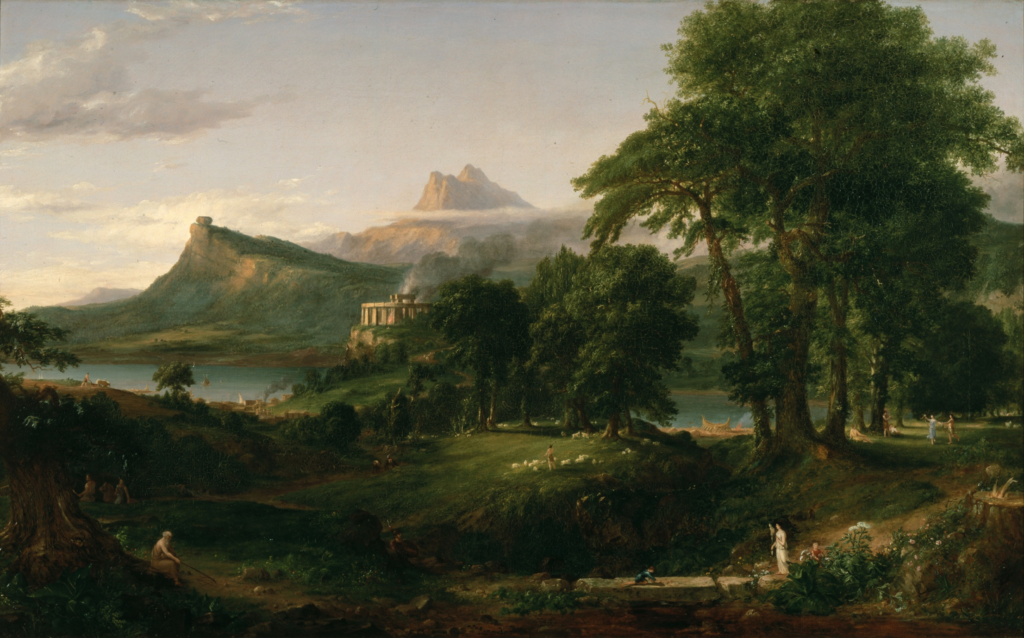Shepherds' chorus
(Poet's title: Hirtenchor)
Set by Schubert:
D 797/7
for SATB chorus and orchestra[December 1823]
Hier auf den Fluren mit rosigen Wangen
Hirtinnen eilet zum Tanze herbei,
Lasst euch die Wonnen des Frühlings umfangen,
Liebe und Freude sind ewiger Mai.
Hier zu den Füßen, Holde dir, grüßen
Herrscherin von Arkadien wir dich.
Flöten, Schalmeien
Tönen, es freuen
Deiner die Fluren, die blühenden sich.
Von Jubel erschallen die grünenden Hallen
Der Höhen, die luftig,
Der Fluren, die duftig
Erglänzen und strahlen in Liebe und Lust,
In schattigen Talen,
Da schweigen die Qualen
Der liebenden Brust.
Here on these meadows with pink cheeks,
Shepherdesses, hurry along and start dancing,
Allow yourselves to be embraced by the delights of spring,
Love and joy are eternally May.
Here at your feet, beauteous one, we greet you,
Mistress of Arcadia.
Flutes, shawms
Resound, the fields delight
In you as they blossom.
Ringing out with jubilation are the green spaces,
The airy heights,
The fragrant meadows,
They are gleaming and shining with love and delight,
In shady valleys
The torments
Of loving breasts are silenced.
All translations into English that appear on this website, unless otherwise stated, are by Malcolm Wren. You are free to use them on condition that you acknowledge Malcolm Wren as the translator and schubertsong.uk as the source. Unless otherwise stated, the comments and essays that appear after the texts and translations are by Malcolm Wren and are © Copyright.
☙
Themes and images in this text:
Cheeks Chest / breast Dancing Eternity Fields and meadows Flowers Green May Pipes and flutes Shepherds Spring (season) Valleys
Arcadia, a mountainous region in central Greece, was represented in Greek and Roman mythology as an earthly paradise. It was the land of Pan, the god of woods, fields, and flocks. Cut off from the rest of Greece by mountains, the people of ancient Arcadia could pursue their simple way of life, based on agriculture and herding, without interruption or influence from the outside world. But the land fell into decay after being conquered by the Romans. The image of Arcadia as an ideal state of peace and simplicity has been used by poets and artists through the ages. Ancient authors such as Theocritus and Virgil sang its praises. It appears in later works of literature such as Arcadia by the Italian poet Sanazaro and The Shepherd's Calendar by English poet Edmund Spenser. However, another English poet, William Cowper, attacked the idea of using Arcadia to symbolize an ideal state that never really existed, especially for poor country people. http://www.mythencyclopedia.com/Am-Ar/Arcadia.html#ixzz6hILB1OA3

New York Historical Society
https://commons.wikimedia.org/wiki/File:Cole_Thomas_The_Course_of_Empire_The_Arcadian_or_Pastoral_State_1836.jpg
Original Spelling Hirtenchor Hier auf den Fluren mit rosigen Wangen, Hirtinnen, eilet zum Tanze herbei, Laßt euch die Wonnen des Frühlings umfangen, Liebe und Freude sind ewiger Mai. Hier zu den Füßen, Holde dir, grüßen Herrscherin von Arkadien wir dich. Flöten, Schalmeien Tönen, es freuen Deiner die Fluren, die blühenden sich. Von Jubel erschallen die grünenden Hallen Der Höhen, die luftig, Der Fluren, die duftig Erglänzen und strahlen in Liebe und Lust, In schattigen Thalen, Da schweigen die Qualen Der liebenden Brust.
Confirmed by Peter Rastl with Rosamunde. Drama in fünf Akten von Helmina von Chézy. Musik von Franz Schubert. Erstveröffentlichung der überarbeiteten Fassung. Mit einer Einleitung und unbekannten Quellen herausgegeben von Till Gerrit Waidelich. Verlegt bei Hans Schneider [Tutzing] 1996, p. 111.
Note: The libretto of Chézy’s initial version of her play, with the title Rosamunde, Fürstinn von Cypern, which was staged in 1823 in Vienna with Schubert’s music, is lost. This original version of the play comprises 4 acts. The manuscript of a revised version of Rosamunde in 5 acts has lately been discovered and published. The Hirtenchor set by Schubert appears in act 3, scene 5 of the revised version.


